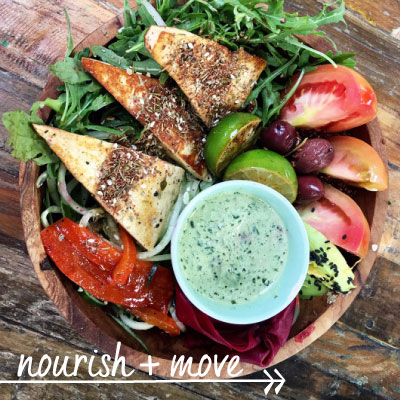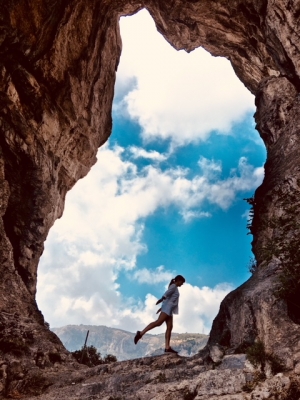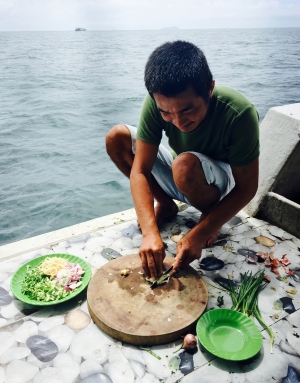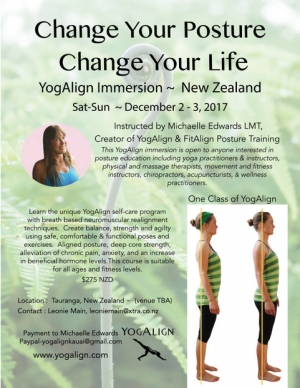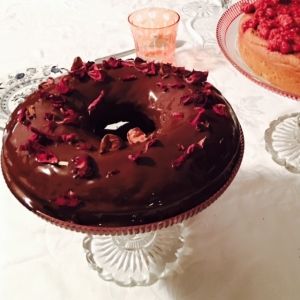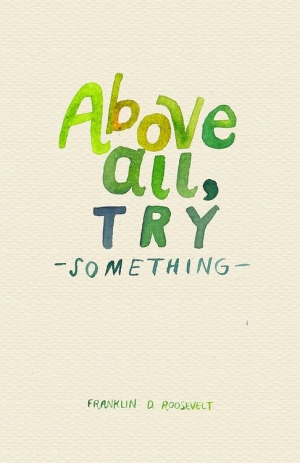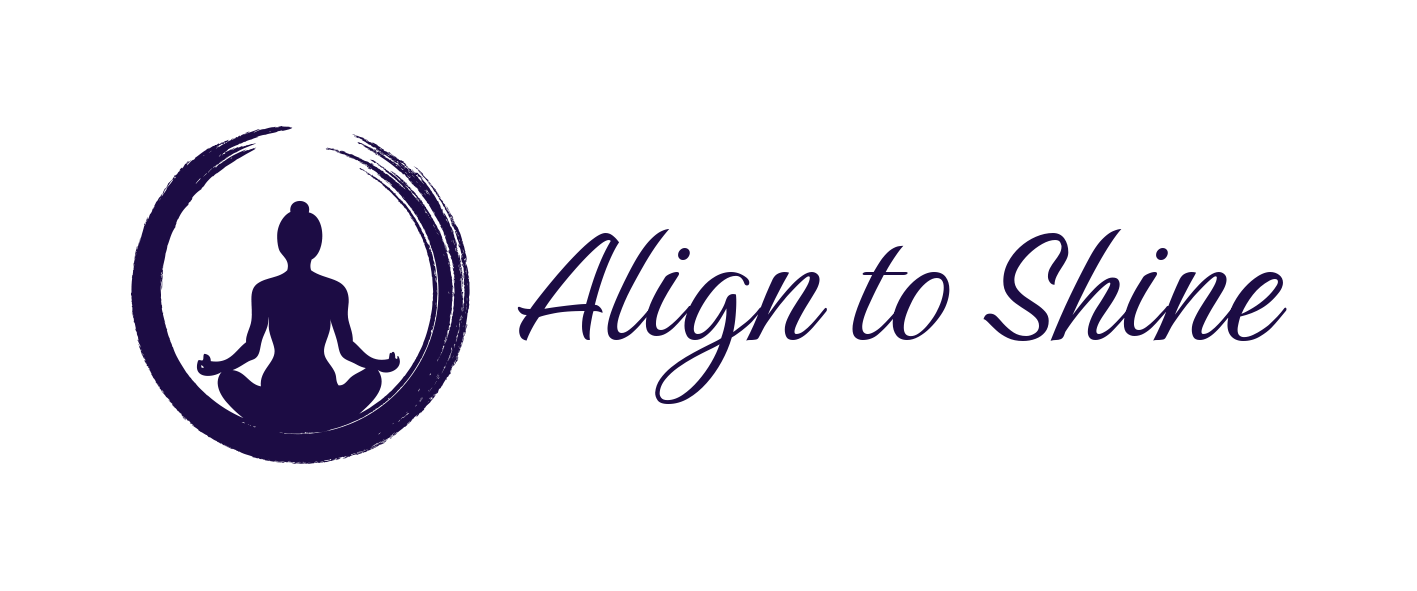
Displaying items by tag: wanderlust
Breathing is an Extraordinary Event!
Breathing is an extraordinary event. Not only does it bring oxygen to your cells, but also gives your organs, endocrine system & inner connective tissue a massage from the inside out with every breath.
YogaAlign's breathing exercises are designed to help you fully awaken, supercharge & recode your breath & posture at the nervous system level.
When you breathe in, try moving the ribs out in all directions as though you are inflating a balloon. As you inhale your outer rib muscles pull the ribs apart as your diaphragm contracts downwards, creating more space in the chest area & allowing the lungs to expand & fill with air.
As you exhale, notice the internal intercostal muscles pulling the ribs back together, while the outer muscles of the abdomen & waist area contract & press the air out.
Take a few moments each day to ground yourself with a few deep breaths, toning, lengthening & strengthening.
Practice Squatting to Stay Forever Young
Before the invention of the chair, squatting was part of everyone's daily life.
Today, few people can squat without pain or injury. The YogAlign squat helps release tension in your hips & legs.
This is a pose that will tone your pelvic floor & abdominal organs & in particular, your bladder. In cultures where squatting is done every day, people stay flexible & aligned well into advanced age.
Prostate & colon cancer, knee & hip replacements, & osteoarthritis are rare in cultures that still squat. This pose also aids the digestive & elimination processes & brings a feeling of lightness to your body.
Unless you are a seasoned squatter with excellent knees, it is best to use a strap for support in this pose, to keep compression off your knees.
Place a strap around a post or tree, holding one end in each hand. Slowly drop into a squatting position, with arms straight & engaged strongly through your lats to your hips & into your trunk. Activate your shoulder blade muscles to keep the blades stabilised & your neck elongated. Position the strap just below shoulder level, & keep your feet slightly turned out. Stay on the balls of your feet as you slide back, pulling on the straps while you squat with a lift in your waist, curve in your lower back & your entire spine & skull in natural alignment.
For further details consult your local YogAlign teacher or check out Michaelle Edwards's book YogAlign - Pain-Free Yoga From Your Inner Core www.yogalign.com
YogAlign Creator Michaelle Edwards is coming from Kauai, Hawaii to teach in Tauranga
Join us for Michaelle Edward's two day YogAlign Workshop in Tauranga
Change Your Posture, Change Your Life
If you are Open to Learning & Enthusiastic about Optimising Your Wellness this Workshop is for You
Date: Saturday 2nd & Sunday 3rd of December 2017
Venue: Ohauiti Settlers Hall, 459 Ohauiti Road, RD3, Tauranga, New Zealand
Connecting with Nature to gain Optimal Wellness
Deep Ties to the Earth: How One Northern Cree Tribe Finds Peace of Mind

Mybona/Thinkstock
A new study reveals that the community’s strength and resilience are tied to the people’s spiritual openness, community engagement, and connection to the land.
Only when the last tree has died and the last river been poisoned and the last fish been caught will we realize we cannot eat money. — Cree Proverb
In northern Ontario, near Hudson Bay, lies a remote, fly-in only Cree community with significantly lower rates of depression and suicide than other aboriginal communities in the area. In an effort to understand why this is so, a couple of researchers obtained grant funding, ventured into the area and asked the community members themselves. The findings of their study are published in the International Journal of Mental Health and Addiction.
The researchers wanted to avoid the Western medical model of focusing on pathology, or illness, alone, so they chose to interpret the participants’ responses according to the “medicine wheel” of traditional healing. This wheel reflects the four dimensions of the self (mental health, physical health, emotional health and spiritual health) as equal parts of a larger whole.
Overall, the findings reveal that the community’s strength and resilience in all four of these areas of health are tied to the people’s spiritual openness, community engagement, shared parenting, and perhaps most notably—a very deep connection to the land and traditions. In fact, most striking to the researchers was the way in which a connection to the land was interwoven throughout all of their responses.
For example, the community members said that their practice of harvesting and hunting their own food provides them with several important benefits: healthy meals, physical exercise and a connection to Cree traditions and cultural practices. They also believe in the importance of benefiting from the entire animal with one respondent saying “when people just harvest this for the sake of the meat and throw away a lot of stuff…they’ve lost their culture totally.”
Seeing wild animals on a regular basis is another fantastic perk, and the land is open and free, allowing people to feel comfortable where they are. In what was perhaps a particularly telling response, one participant said that the community did not “administer social assistance” as it has the potential to make “people totally quit from living off the land.”
The land itself is considered a source of spiritual renewal and healing. The respondents spoke of having a way of life that is still in touch with the natural flow and rhythm of wildlife. A majority referred to their relationship with the earth as a spiritual connection: “when you’re there, it’s like your spirit, your mind, and your physical well-being – everything improves when you’re out there; it’s like you rejuvenate while you’re out there.”
Perhaps the rest of us can learn from these important findings as well and give us substantial food for thought: How disconnected do you feel from the land? Do you take long random walks in nature? Do you see animals on the regular? Do you garden—or at least know where your food comes from? If not, make an effort this week to forge a deeper connection to the earth. Perhaps you will notice a different state of mind—and even a little peace of mind.
Traci Pedersen is a professional freelance writer who specializes in psychology, science, health, and spiritual themes. Some of her most recent work includes covering the latest research news in science and psychology, writing science chapter books for elementary students, and developing teacher resource books. When she is not researching and writing, she is spending time with her family, reading anything and everything, and going to the beach as often as possible.
Food Frustrations with Dr Libby Weaver
Tauranga - Wednesday, 30 August 2017
By Dr Libby Weaver
In this powerful two-hour event Dr Libby takes all the confusion out of food. In her usual down-to-earth style, she’ll guide you with the best food choices to make for you, helping to remove any guesswork from what to eat, when and why.
Date:
Wednesday, 30 August 2017
Where:
ASB Baypark Stadium, Stadium Lounge - 81 Truman Ln, Te Maunga, Tauranga
Times:
7:00pm - 9:00pm (doors open 6:15pm).
Tickets:
$39.95 (pre-sale price) there are no physical tickets for this event, your name will be on our door list
Door sales:
$45.00 limited door sales available at the event, unless sold out prior
If you have any questions, please send them to: This email address is being protected from spambots. You need JavaScript enabled to view it.
Easter Treats
I tried the Chocolate & Zucchini cake this Easter weekend and would definitely bake and indulge again. It is dark and moist with Whittakers 72% cocoa Dark Ghana Chocolate, chopped up for my chocolate chips. Chocolate ganache was poured over the top & then a sprinkling of dried rose petals.
The Nature of Spirituality

Pablo's Cabana, Great Barrier Island, New Zealand, January 2017
Because sometimes lying under the trees and walking barefoot on the earth is the most spiritual thing you could ever do in your life.
The hidden cause of your allergies + what to do about it
by Dr Leo Galland - 7 January 2017
When allergies or inflammation strikes, you may be quick to blame some common culprits like pollen and ragweed, pets, pollution, or food. But what you may not know is that one of the biggest causes of allergy and inflammation is actually your mind.
How you feel and the amount of stress you experience—from work, to family, to your health—can have a direct impact on how your body feels. Researchers from the University of Wisconsin-Madison found that stress is a major factor in causing chronic inflammatory conditions but that stress reduction interventions can actually help reduce symptoms.
The combination of stress and allergies creates a snowball effect.
Ohio State University scientists found that the persistence of mental stress can increase the frequency of flare-ups in allergy sufferers. And more episodes of sneezing, running nose, and watery eyes can lead to more stress and worsening symptoms. Conversely, less stress is associated with fewer flare-ups. They also found that stress and mood could affect allergic sensitivity. Nasal allergy sufferers who were asked to perform mental arithmetic in front of an audience experience bigger hives in response to a skin test. Participants who weren't given the math questions didn't have the same allergic response.
But the good news is that your mind can outshine your allergies. These seven simple tips can help you reduce stress, calm your body, and kick pesky allergies.
1. Give meditation a try.
While meditation has been touted as the answer to everything from pain relief to improving your athletic performance, it really can help reduce your body's response to allergy and inflammation. Researchers from the University of Wisconsin-Madison found that mindfulness-based stress reduction—which combines mindfulness, yoga, and body awareness—not only helped participants cope with stress, but it also decreased inflammation in the body compared to other healthy practices like exercise and music therapy.
In another study on people with migraine headaches and abdominal pain, scientists from Case Western Reserve University found that meditation and visualization reduced pain and signs of allergic inflammation. Meditation with visualization has also been shown to improve lung function and respiratory symptoms in groups of people with asthma. Try this simple meditation:
-
Sit in a comfortable place.
-
Imagine a hand resting on your forehead, giving your mind comfort and soothing your thoughts.
-
Let any stressful thoughts float out of your mind and into the imaginary hand.
-
Notice the sense of spaciousness and calm without those extra thoughts.
2. Make sleep a top priority.
According to the American Academy of Sleep Medicine, those who experience chronic stress report shorter sleep duration and lower quality of sleep. A group of Italian researchers found that the lack of adequate shut-eye can also lead to increased oxidative stress and altered inflammatory response—among other health concerns.
Sleep is one of the best ways to heal and rejuvenate your body. To get the best sleep, be sure to avoid caffeine late in the day and create a calming bedtime ritual. And don't forget to turn off your screens! Exposure to blue light can suppress the release of melatonin, your body's sleep-facilitating hormone, and shift your circadian clock.
3. Take an Epsom salt bath
A warm bath is super relaxing, but it can also help your body recharge. Stress can reduce levels of magnesium in the body, and Epsom salts—which are composed of magnesium sulfate—can help replenish these stores. Researchers from the University of Birmingham in the United Kingdom found that soaking in an Epsom salt bath for 12 minutes a day for a week raised magnesium levels measurably.
4. Get outside and clear your head.
Sometimes just getting out in nature is all we need to banish stress. In fact, researchers from Stanford observed that those who took a stroll in a parklike setting had meaningful improvements in mental health including less brooding compared to those who walked in an urban setting. Scientists from Finland found that even a brief visit to a green space can reduce stress levels.
5. Journal to reduce the impact of stressors.
Who hasn't scribbled in a journal after a stressful, emotional, or traumatic event? And there's good reason. Researchers from the University of Texas at Austin observed that writing about stressful events can reduce the impact of those stressors; it helped lessen the intensity of the feelings and lowered symptoms of depression. Even more interesting, researcher from the United Kingdom shows that expressive writing improves lung function in asthma sufferers.
6. Hang out with friends.
Instead of staring at your phone or computer screen, hang out with your friends. Social connection can be a strong buffer against the effects of stress. A study from Carnegie Mellon University and the University of California found that participating in a meditation group not only decreased feelings of loneliness, but it decreased systematic inflammation in the body by decreasing the activity of a gene that promotes inflammation in the body.
7. Dance your allergies away.
Yes, dance! Researchers have discovered that dance therapy can benefit those with high blood pressure, depression, fibromyalgia, rheumatoid arthritis, and asthma. Music influences mood in a positive way, and, more importantly, relaxing music may reduce levels of cortisol—the main stress hormone in the body.
The bottom line is that allergies and inflammation involve a lot more than just our environment and what we put in and on our bodies. They are also directly connected with what's going on in our mind. For more information about ways to reduce stress and combat allergies, check out my book The Allergy Solution: Unlock the Surprising, Hidden Truth About Why You Are Sick and How to Get Well.
Wanderlust - Great Lake Taupo
Wanderlust
Wairakei, Great Lake Taupo
Thursday 2 - Sunday 5 February 2017
A 4 day Celebration of Mindful Living
Love & Laugh Abundantly
Contact Leonie Main
m: +64 (0) 274 96 96 33
19B Golf Road, Mount Maunganui 3116, New Zealand
Facebook: Gypset Life
